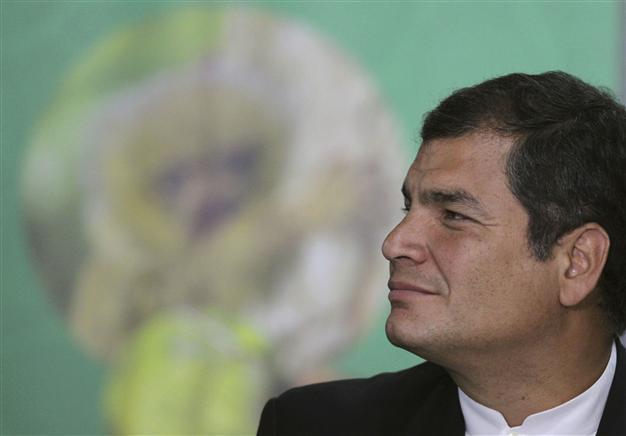Ecuador's Correa says mulling Assange asylum bid
RIO DE JANEIRO - Agence France-Presse

Ecuador's President Rafael Correa attends the Rio+20 United Nations sustainable development summit in Rio de Janeiro June 20, 2012. REUTERS/Sergio Moraes
Ecuador is weighing whether WikiLeaks founder Julian
Assange's request for political asylum is motivated by fears of a death sentence or persecution for ideological reasons, its president told AFP late Wednesday on the sidelines of a UN summit.
The 40-year-old Australian turned up Tuesday at Ecuador's embassy in London, seeking asylum after Britain's Supreme Court turned down a last ditch appeal of his extradition to Sweden over alleged sex crimes.
Assange maintains that the allegations are politically motivated and that Sweden will deport him to the United States to be put on trial for WikiLeaks's disclosure of a huge trove of US classified documents.
"Ecuador is a country which defends the right to life. We have to see whether there is a threat to Julian Assange's life," President Rafael Correa told AFP.
"Ecuador is a country which defends due process. We have to assess whether he was accorded due process. Ecuador is a country which rejects persecution on ideological grounds," he added.
The leftist Ecuadoran leader, who has often been at odds with Washington, was attending the Rio+20 summit on sustainable development.
"He (Assange) presented his reasons. We are going to verify them...We will take the time necessary, with absolute seriousness and absolute responsibility," he added.
Correa said Assange's asylum request was the "best answer" to those who say there is no freedom of expression in Ecuador.
Ecuador's leftist government had offered Assange residency in 2010 in sympathy over WikiLeaks's disclosure of the US documents.
Although Quito backtracked on the residency offer, Assange appeared to hit it off with Correa in April in a talk show interview aired by Russia Today, a television network that backs Russian President Vladimir Putin.
Correa welcomed Assange to the "club of the persecuted" in the interview, and Assange reciprocated by expressing support for Correa in his bitter battles with Ecuador's privately owned
